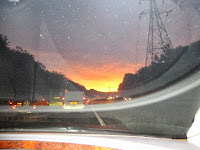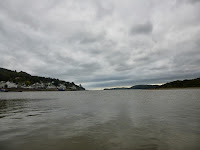I'm on my Christmas holidays.
Christmas Day was spent with family. Christmas dinner was a Cashew and Mushroom
Layered Loaf (there was turkey for those that just had to have it). Then Boxing
Day it was up to the House in Scotland. It was a nightmare journey; ice on the
roads and that winter sunshine that is just too low in the sky as you drive. The
further North I got the stronger the wind became and then the rain started to
pour.
Driving down the hill that leads into
the village I was surprised to see there wasn't a space to be had in the
Village Hall car park, or a table at the Anchor Hotel bar. Despite the gale
force winds and driving rain, the whole place was busy with families, groups of
friends and there were dogs everywhere.
Someone had even parked their car in front of Mary’s cottage, strictly
verboten in the unwritten but usually carefully adhered to village rules.
On the day after Boxing Day, Friday,
there wasn't a soul to be seen. The road, beaches, woods and by ways were completely
deserted. I twice walked Cello and didn't see a single person. The village had
returned to its quietness and the simple twice daily movement of the tide
coming in and the tide going out again. As 2013 draws to a close it’s a time for
reflection, and for me this is a wonderful place to be, and to be able to sit
and contemplate the passing year and to think about ambitions for the future.
However I know that others were finding themselves
in very different places – much of the South of England has been battered by
damaging storms, and many families still have no power or heat, a situation
they have been in since Christmas Day. Here in Scotland, like in many other
parts of the UK, over 2000 food parcels were handed out over the Christmas
period, 1200 meals prepared for people in homeless shelters, and just under 200
people sought help over a 4 hour period at a winter destitution ‘surgery’ held
by the Glasgow based charity, Positive Action in Housing last week. They wanted help with crisis payments,
clothing, food and bus passes to get them through the Christmas period. As the
Christmas snows fall in war torn Syria, an estimated 3.1 million children have little food or shelter, and more than 1 million children are now living in refugee camps. Oppression of peoples basic human rights continues in many parts of the world. I had an email from a colleague in China yesterday. She can read the VCs Blog, but not this one.The China Government have banned access to it!
Seeing or hearing of other peoples
suffering often causes emotional pain and can give rise to empathy, an element
of caring and compassion that is sometimes clouded by unconscious notions of guilt when
there is nothing that we can seemingly do to help or relieve the suffering of
others. 2014 will be my 7th year as Head of School. I once had a clear
10 year plan for the School which was about more effectively preparing nurses so
they could better able to help others help themselves. Over the years this plan has been
renewed and re-constructed as the School has grown and the challenges have
changed. My Christmas contemplations will include how as a School we can continue
to help others to more effectively help themselves. Many thanks to all of you have supported me by continuing to read this blog over the past year. I wish you and yours the very best for 2014.






















































